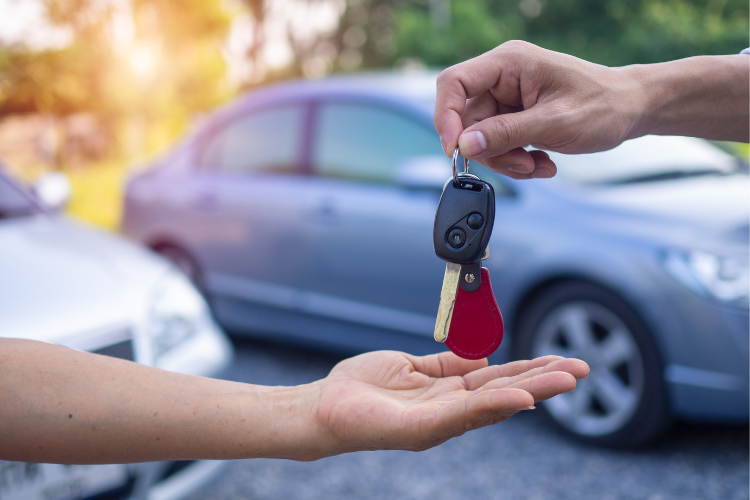Last Updated on January 8, 2025 by Laila Oliveira
Are you considering buying a car in Spain? Whether you’re moving to the sunny coasts of the Mediterranean or the vibrant streets of Madrid, having your own vehicle can make life much easier. In this comprehensive guide, we’ll walk you through everything you need to know about buying a car in Spain.
From understanding the costs and taxes to finding the best places to purchase your vehicle, we’ve got you covered.
Owning a car provides you with the freedom to explore at your own pace and convenience, which can be especially beneficial in a country as diverse and expansive as Spain.

Is Buying a Car in Spain Worth It?
Deciding whether buying a car in Spain is worth it depends on several factors.
Firstly, Spain’s public transport system is excellent, but it may not always cover your specific needs. Having a car provides the freedom to explore off-the-beaten-path destinations and travel at your own pace.
Furthermore, owning a car can be more convenient for families or individuals with specific commuting requirements.
Financially, buying a car in Spain can be a good investment.
The cost of vehicles is relatively lower compared to other European countries. For example, the cost of buying a car in Spain may differ significantly from buying a car in Portugal.
When considering the cost of a car purchase in Spain, it’s useful to compare prices with other major European countries.
Based on data from Numbeo, we can see how Spain’s car prices stack up against those in France, Germany, Italy, and the United Kingdom.
Here’s a comparison of the average prices for a car in selected EU Countries:
| Country | Average Price |
|---|---|
| Spain | €23,000 |
| France | €35,046 |
| Germany | €29,404 |
| Italy | €27,046 |
| Portugal | €32,483 |
Additionally, Spain has a wide range of new and used cars to suit different budgets. If you plan to stay in Spain long-term, the convenience and independence of owning a car can outweigh the initial costs.
Public transport in Spain may not reach remote locations, so a car is essential for exploring off-the-beaten-path areas.
What You Should Know Before Buying a Car in Spain
Before you dive into the process of buying a car in Spain, there are several important aspects to consider.
First, you need to have a clear understanding of the legal requirements and documentation needed.
This includes having a valid Foreigner Identification Number (NIE), proof of residency, and a Spanish bank account.
Additionally, knowing the local driving regulations and obtaining the necessary insurance are crucial steps.
Legal Requirements
The first step to buying a car in Spain is obtaining the necessary legal documents. The NIE (Número de Identificación de Extranjero) is essential for any legal transaction in Spain.
It serves as your identification number for all fiscal transactions. Proof of residency, such as a rental contract or utility bill, is also required to confirm your address.
Finally, having a Spanish bank account is necessary for setting up payments and managing financial transactions related to the purchase.
Understanding Local Regulations
Familiarizing yourself with local driving regulations is crucial. Spain has specific rules and regulations that may differ from those in your home country.
For example, understanding speed limits, parking rules, and road signs can help you avoid fines and ensure a safe driving experience.
Additionally, knowing the requirements for regular vehicle inspections (ITV) is important to maintain your car’s roadworthiness and compliance with environmental standards.
Insurance Requirements
Car insurance is mandatory in Spain. You must have at least third-party liability insurance covering damage to other vehicles and property. It’s advisable to explore different insurance options to find the best coverage for your needs.
Comprehensive insurance can provide additional protection against theft, vandalism, and natural disasters.
Having the right insurance ensures that you are financially protected in case of accidents or unexpected events.
Importing Cars May Be Very Expensive
If you are thinking about importing a car from your home country, be prepared for potentially high costs. Import taxes and duties can be significant, and the process can be complex.
It’s often more cost-effective to buy a car locally in Spain. Imported cars also need to comply with Spanish regulations, which may require modifications.
Know Your Taxes
When buying a car in Spain, it’s important to be aware of the various taxes involved.
These include the registration tax (Impuesto de Matriculación), which is based on the vehicle’s CO2 emissions, and the road tax (Impuesto sobre Vehículos de Tracción Mecánica). Additionally, if you purchase a new car, you’ll need to pay VAT (IVA).
Understanding these taxes will help you budget accurately for your new vehicle.
Registration Tax
The registration tax is a significant expense when buying a car in Spain.
It is calculated based on the car’s CO2 emissions, with higher-emission vehicles attracting higher taxes. The rates can vary, so it’s important to check the specific tax rates applicable to the car you are considering.
Understanding how this tax is calculated will help you make an informed decision and budget accordingly.
Road Tax
The road tax is an annual fee that all vehicle owners must pay.
The amount varies depending on the type and size of the vehicle and the region in which you live. This tax contributes to the maintenance of roads and infrastructure.
Knowing the road tax for different types of cars can help you estimate the ongoing costs of car ownership in Spain.
VAT (IVA)
When purchasing a new car, you will need to pay VAT. The standard rate is 21%, which can significantly impact the overall cost of the vehicle.
For used cars, VAT may also apply, but the rate and calculation method can differ.
It’s important to understand how VAT is applied to avoid unexpected expenses and ensure you are compliant with tax regulations.
Don’t Forget About Warranties, Insurance, and Inspections
Warranties and insurance are essential components of car ownership in Spain.
Ensure that the car you are buying comes with a valid warranty, especially if it’s a used vehicle.
Car insurance is mandatory, and you can choose from various coverage options depending on your needs. Regular inspections (ITV) are also required to ensure that your car meets safety and environmental standards.
Warranties
When buying a car, especially a used one, it’s crucial to check if it comes with a warranty.
A warranty provides protection against defects and mechanical issues for a specified period. New cars typically come with manufacturer warranties, but used cars may have limited or no warranty.
Ensuring that your purchase includes a warranty can save you from unexpected repair costs.
Insurance Coverage
Car insurance is not only mandatory but also essential for financial protection.
Third-party liability insurance is the minimum requirement, covering damage to other vehicles and property.
Comprehensive insurance offers broader coverage, including theft, vandalism, and natural disasters.
Comparing different insurance policies and understanding what each covers will help you choose the best option for your needs.
Regular Inspections (ITV)
In Spain, all vehicles must pass regular inspections known as ITV (Inspección Técnica de Vehículos).
These inspections ensure that your car meets safety and environmental standards. The frequency of inspections depends on the age and type of vehicle.
Failing to comply with ITV requirements can result in fines and potentially render your car illegal to drive. Keeping up with these inspections is crucial for maintaining your car’s legality and safety.
Where to Buy a Car in Spain
There are several avenues to explore when buying a car in Spain. Dealerships are a popular choice, offering a wide range of new and certified used cars. They often provide financing options and after-sales services, making the process more convenient.
Dealerships
Visiting a dealership can give you the opportunity to test drive different models and receive professional advice.
Dealerships are located throughout Spain, and many offer bilingual services to assist foreign buyers.
They often provide warranties, financing options, and after-sales support. Choosing a reputable dealership ensures that you get a reliable car and support throughout your ownership.
Online Platforms
In addition to traditional dealerships, there are numerous online platforms where you can buy cars in Spain.
These websites provide a convenient way to compare prices, models, and features from the comfort of your home.
Online platforms often have extensive listings of new and used cars, complete with detailed descriptions and photos. They also allow you to filter your search based on criteria such as price, brand, and location.
Private Sellers
Another option is to buy from private sellers. This can sometimes lead to better deals, but it comes with higher risks.
It’s important to thoroughly inspect the vehicle and verify its history before making a purchase.
Private sales may not offer warranties or after-sales support, so ensuring the car’s condition and legal status is crucial.
Let’s Move to Europe
With Viv Europe your plans for Europe will come to a reality
The Best Websites to Buy Cars Online in Spain
Several websites stand out for their reliability and user-friendly interfaces. Here are some of the top options:
Canalcar
Canalcar is a trusted platform for buying both new and used cars. It boasts an extensive inventory that includes various brands and models. This variety ensures that customers can find cars that fit their specific needs and budgets.
Whether you’re looking for a compact city car, a spacious family vehicle, or a luxury model, Canalcar has options to suit every preference.
The platform provides detailed descriptions and high-quality images for each vehicle, giving potential buyers a clear idea of the car’s condition and features.
This transparency helps build trust and confidence among customers, reducing the uncertainty often associated with purchasing used cars.
Drivim
Drivim provides a comprehensive inventory of cars, with options to filter based on your preferences.
They also offer financing and delivery services. Drivim’s platform is user-friendly, allowing you to search for cars by brand, price, and location. Their transparent pricing and detailed vehicle descriptions help you make informed decisions.
Drivim’s user-friendly interface makes it easy to navigate their extensive catalog of vehicles. Buyers can filter searches by brand, price range, location, and other criteria, making it simple to find the perfect car.
The platform also offers detailed vehicle descriptions and high-resolution images, providing potential buyers with all the necessary information to make an informed decision.
This level of detail helps to build confidence and trust in the buying process, especially for those who may be purchasing a car online for the first time.
Carnovo
Carnovo is known for its transparent pricing and extensive range of vehicles. The platform allows you to compare different models and find the best deals. Carnovo offers a unique service where they negotiate with dealers on your behalf to get the best price. This can save you time and money while ensuring that you get a fair deal on your new car.
Carnovo’s platform stands out for its transparent pricing and the ability to compare various models side by side.
This feature allows buyers to see the differences in specifications, features, and prices at a glance, making it easier to make an informed decision.
The platform includes a wide range of vehicles from different manufacturers, catering to diverse preferences and budgets.
Whether you’re looking for an economical car for daily commuting or a high-end luxury vehicle, Carnovo provides ample options to choose from.
How Much Do Cars Cost in Spain?
The cost of cars in Spain can vary significantly depending on the city and type of vehicle. Here’s a breakdown of average prices in different cities:
| City | Average Price for New Car | Average Price for Used Car |
|---|---|---|
| Madrid | €20,000 – €30,000 | €10,000 – €20,000 |
| Barcelona | €22,000 – €32,000 | €12,000 – €22,000 |
| Valencia | €18,000 – €28,000 | €9,000 – €18,000 |
| Sevilla | €19,000 – €29,000 | €10,000 – €19,000 |
| Bilbao | €21,000 – €31,000 | €11,000 – €21,000 |
Price Variations
The prices of cars can vary significantly based on the city due to factors like demand, availability, and economic conditions.
For instance, cars in larger cities like Madrid and Barcelona tend to be more expensive than those in smaller cities like Valencia or Sevilla.
Additionally, the cost of living in Spain compared to other cities can impact the overall price of cars, including taxes and registration fees.
New vs. Used Cars
The decision to buy a new or used car also affects the price.
New cars come with the latest features, warranties, and financing options, but they depreciate quickly.
Used cars are more affordable and can be a good value if they are in good condition.
However, they may come with higher maintenance costs and limited warranties. Evaluating your budget and preferences will help you decide which option is best for you.
Additional Costs
Apart from the purchase price, there are additional costs to consider when buying a car in Spain.
These include insurance, taxes, registration fees, and regular maintenance. It’s important to factor in these ongoing expenses to get a clear picture of the total cost of ownership.
Being aware of these costs helps you plan your budget more effectively and avoid unexpected expenses.
Buying a Car in Spain: Documents and Registration
To buy a car in Spain, you’ll need to gather several important documents. These include:
- NIE (Foreigner Identification Number): Essential for any legal transaction in Spain.
- Proof of Residency: Such as a rental contract or utility bill.
- Spanish Bank Account: Necessary for financial transactions and setting up payments.
- Insurance Policy: Required before you can legally drive the car.
The registration process involves transferring the vehicle’s ownership to your name and obtaining a new registration certificate.
NIE and Proof of Residency
The NIE (Número de Identificación de Extranjero) is a crucial document for foreigners living in Spain.
It is used for all fiscal transactions, including buying a car.
To confirm your address, you must also provide proof of residency, such as a rental contract or utility bill.
These documents are essential for registering and ensuring the vehicle is legally registered in your name.
Spanish Bank Account
Having a Spanish bank account is necessary for managing financial transactions related to the car purchase.
It allows you to set up payments, pay taxes, and handle other expenses.
Many dealerships and private sellers require a Spanish bank account to complete the sale. Setting up a bank account in advance can streamline the buying process.
Insurance and Registration
Car insurance is mandatory in Spain, and you must have a valid insurance policy before you can legally drive the car.
The registration process involves transferring the vehicle’s ownership to your name and obtaining a new registration certificate.
This process includes paying the necessary taxes and fees. Understanding the steps involved and having all the required documents ready can make the registration process smoother and faster.
How Can a Foreigner Get a Driver’s License in Spain?
Foreigners can drive in Spain using their international driving permit for up to six months. After this period, you will need to obtain a Spanish driver’s license.
The process involves passing a theoretical exam and a practical driving test.
It’s advisable to enroll in a local driving school to familiarize yourself with Spanish traffic laws and road signs.
An international driving permit allows you to drive in Spain for up to six months. It is a temporary solution that gives you time to get accustomed to the local driving environment.
During this period, you can gather the necessary documents and prepare for the Spanish driver’s license exams.
It’s important to note that after six months, driving with only an international permit becomes illegal.
How Can I Exchange My Driver’s License for the Spanish One?
If you hold a driver’s license from an EU/EEA country, you can exchange it for a Spanish license without taking a driving test.
For non-EU licenses, the process may involve additional steps, including passing a practical test. The exchange process requires your current license, Passport, NIE, proof of residency, and a medical fitness certificate.
EU/EEA License Exchange
Exchanging an EU/EEA driver’s license for a Spanish one is relatively straightforward.
You will need to submit your current license, Passport, NIE, proof of residency, and a medical fitness certificate.
This process does not require you to take a driving test. The exchange process ensures that your driving privileges are recognized in Spain, allowing you to drive legally without additional testing.
Non-EU License Exchange
For non-EU licenses, the process can be more complex.
You may be required to take a practical driving test to demonstrate your driving skills.
The specific requirements can vary depending on your country of origin. Gathering all necessary documents and understanding the requirements in advance can help you navigate the process more smoothly.
Medical Fitness Certificate
A medical fitness certificate is required for exchanging your driver’s license.
This certificate confirms that you are physically and mentally fit to drive.
You can obtain this certificate from a medical center authorized by the Spanish traffic authorities. Ensuring that you have this certificate ready can expedite the license exchange process.
Are You Looking to Buy a Car in Spain?
Buying a car in Spain can significantly enhance your experience, providing convenience and flexibility.
Whether you’re exploring the countryside or commuting in the city, having your own vehicle offers numerous benefits.
At Viv Europe, we’re here to assist you with all aspects of buying a car in Spain. Our experts can guide you through the process, ensuring a smooth and hassle-free experience.
Need assistance with buying a car or have questions about living in Spain? VIV Europe is here to help!
Our team of experts can provide personalized guidance and support. Book a consultation today and make your journey in Spain enjoyable and stress-free.








